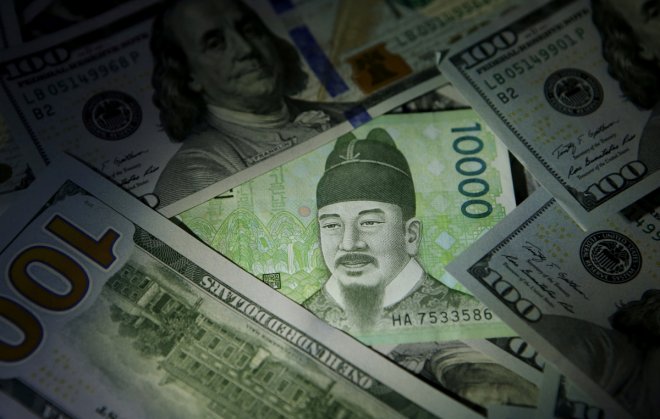
The Korean won has rallied sharply on Tuesday (31 Jan) as the Bank of Korea left key rates unchanged to support growth and helped by the broad US dollar weakness after risk sentiments weakened following Trump's travel ban and related geopolitical uncertainties
USD/KRW slipped more than 1% on the day, making the sharpest daily decline among the most active 16 currency pairs, and taking the Korean unit back near the over 2-month high it hit on 26 Jan.
At 2:45 pm Singapore time, a dollar fetched 1157 won, down 1.06% from Monday's close.
Technically, the pair is testing a key support level near the 50% Fibonacci retrace of the three-month rally to the December peak of 1214, which was a 9-month high.
The support at 1150 falls on the lower range line of the Bollinger bands and is also close to the 100-day simple moving average.
The next levels to keep on the watch will be 1136 (38.2%) and 1118 (23.6%) ahead of a retest of the September low of 1089, which was its lowest since May 2015.
Korean equities were also sharply down on Tuesday in line with most of its regional peers and taking lead from Monday's US share market slide. KS11, the benchmark share index, was down 0.77% at 2067.57 at 2:55 pm.
BoK Policy
South Korea's central bank vowed Tuesday to keep the current monetary easing policy to support growth amid uncertainties at home and abroad.
The BOK has been holding its key rate unchanged at an all-time low of 1.25% since June when it made a surprise rate cut to bolster Asia's fourth-biggest economy.
"We plan to maintain the monetary easing policy to support the recovery of economic growth," the BOK said in a report submitted to the National Assembly.
The central bank said it is committed to stabilize rising household debt through cooperation with the government and the financial authorities as U.S. rate hikes could put debt payment burdens on households.
According to BoK estimates, overall household debt reached a record high of 1,295.8 trillion won (US$1.1 trillion) in the country as of end-September.
The BOK said it will closely monitor changes in financial and economic situations over the pace of U.S rate hike and growing protectionism around the world.
Fed, BoJ
Global financial markets are now waiting for the Feb 1 Federal Reserve policy statement for clues about the central bank's assessment of the macro picture of the United States in the backdrop of the new government's policies.
The Fed had raised its key interest rate by 25 basis points to a range of 0.5-0.75% and has signalled there could be three rate hikes in 2017.
The Bank of Japan on Tuesday announced its monetary policy leaving key interest rates unchanged but said it will purchase more exchange-traded funds (ETFs) and Japan real estate investment trusts (J-REITs) so that their amounts outstanding will increase at an annual paces of about 6.0 trillion yen (S$750 billion) and about 90 billion yen, respectively.








